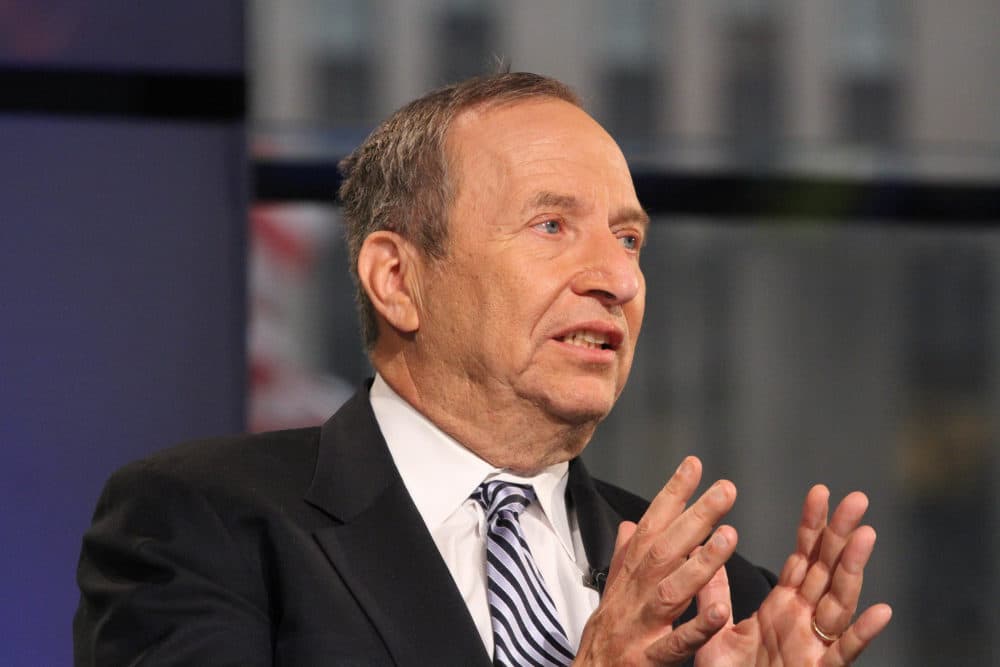Advertisement
Former Treasury Secretary Larry Summers On Economy, Coronavirus

Amid concerns about the spread of COVID-19, global markets have been fluctuating after Wall Street saw its worst week since the 2008 financial crisis.
Larry Summers, former Treasury secretary under Bill Clinton, who also served as director of the National Economic Council under Barack Obama, doesn’t believe the worst is over.
“I don't know what's going to happen next to the market, but in terms of disruption to the economy, I think we're only beginning,” he says.
On Tuesday, the Federal Reserve cut a key interest rate by half a percentage point to try to sidestep the economic implications from COVID-19.
“The fundamentals of the U.S. economy remain strong. However, the coronavirus poses evolving risks to economic activity,” the Fed said in a statement.
Summers disagrees with the move and says enacting a fiscal stimulus is “a much better strategy anyway than reducing interest rates below 1%.”
Because shipments to U.S. ports are decreasing, he says American stores and factories will soon shoulder the economic impact.
“In terms of what's going to happen to the real economy,” he says, “I'd be surprised if we were past the second inning.”
Interview Highlights
On what may happen next in the market
“We have to reckon that there's a real possibility that this is going to be in the broad range of where the flu was after World War One. And if that's the case, we are looking at an event that will possibly dwarf the events that have taken place in wars.”
On whether it’s unavoidable that the U.S. goes into a recession as a result of coronavirus
“No, I think there's a far greater chance of recession within a year than I would have judged six weeks ago. But there's so much uncertainty in this situation that nothing is inevitable. But I'd be very surprised if we didn't see a significant slowing and I think the odds are even or better that we'll go into a recession in the next year. And I think it will be a very difficult recession to combat. Starting with interest rates near zero, any recession would have been hard to combat. And a recession that's induced by the fact that people are afraid to gather together in crowds is going to be a recession that's much more difficult to combat with lower interest rates than normal recessions.”
On his response to President Trump’s tweet that [Jerome] Powell and the Fed are slow to act and the U.S. should lower the interest rate
“The president's comments, as has often been the case before, are confused. Other countries have lower interest rates because they believe in negative interest rates, which many in the United States think would be counterproductive. They have lower interest rates because they are already much closer to a recession. When the reason output is going down is that people aren't leaving their houses because of quarantines, it's not at all clear that monetary policy is going to do anything that is terribly effective. We only have so much room for monetary stimulus left, and we're going to need to dole it out rather than shoot it all off at the very beginning. So I think the president, by making monetary policy look political, is reducing whatever efficacy psychologically it might otherwise have. He would be much better off for storing the funding cuts he made for pandemic preparedness. He would be much better off reversing the decision he made earlier to not regard global health as an essential component of our national security. At a time when supply chains are being ruptured all over the place, we have all the interference we need with international trade. And what he should be doing is scaling back those interferences, not beating the drum about more tariffs.”
Advertisement
On fiscal stimulus
“We certainly should be thinking about fiscal stimulus right now and injecting money directly into the economy through government in order to help people get better and to avoid contracting this disease is a much better strategy anyway than reducing interest rates below 1%.”
Jill Ryan produced and edited this interview for broadcast with Kathleen McKenna. Serena McMahon adapted it for the web.
This segment aired on March 2, 2020.
